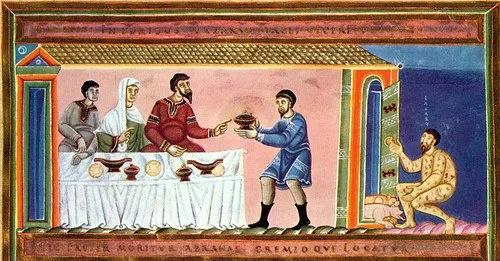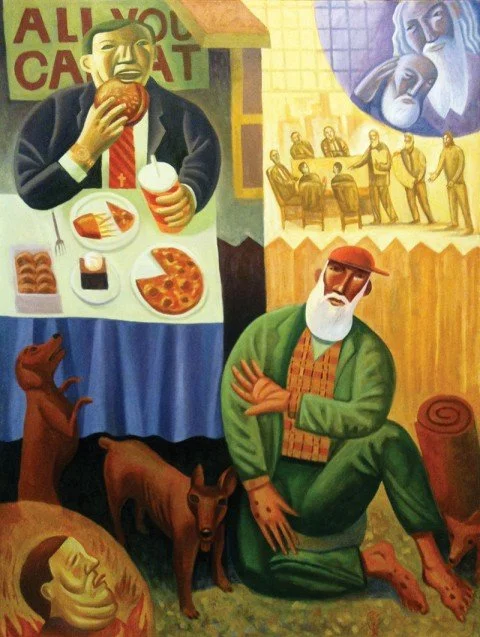lazarus & the rich man
Some days, I am so struck by the inequity in the world, it leaves me breathless. You know those days, when you’re driving down the road in your car that has enough gas in it to get you where you need to go, maybe on your way to work, or to see a friend - and you pull up to a stop light and see someone sitting there on the curb, holding a sign.
There are a lot of stories I could tell myself about why I am at this stop light for a brief moment in the midst of my generally stable life, while this other human being is stuck here, hoping for a water bottle or a few bucks. There are a lot of reasons why our lives are so different, and at the same time, none of those stories truly explains away the discomfort I feel in those moments. Maybe some of it can be explained by different choices we made, but I know that there is truly nothing different about us; there is just this gap, this ever-widening gap between our lives, and I can’t look away from it.
As Jesus traveled around the regions of Galilee and Judea, he must have had the same experience I have while waiting at a red light. Jesus, too, saw and deeply understood the ever-widening gap between the rich and the poor, the powerful and the powerless, the oppressors and the oppressed. And so, he told them a parable: the parable of the rich man and Lazarus.
As we’ve been exploring some of Jesus’s parables in the gospel of Luke lately, we’ve learned that parables are often difficult, challenging to parse. Once we think maybe we’ve got a hold on the meaning of a parable, we look at it from another angle and realize its meaning is more complex than we thought.
But this parable? This one is challenging not because its meaning is hard to grasp; this parable is challenging because its meaning is crystal clear. The gap between the enormously wealthy and the life-threatenly poor that exists in our world? It has cosmic implications; and it is mirrored in God’s economy, in the life that is to come.
This parable has so many poignant moments, so many striking images that stay with you long after you’ve encountered it. What first strikes me is the proximity between these two men, the rich man and Lazarus, while on earth. They were separated only by a gate, and yet they couldn’t be farther apart.
Medieval illumination, The Rich Man and Lazarus
The rich man was not just comfortable - he dressed in purple and fine linens, textiles to boast his wealth. He threw elaborate banquets every day, inviting the other wealthy and powerful into his home. Lazarus, meanwhile, lived in life-threatening poverty, in need of a meal, in need of medical care. We are left to imagine the rich man, purple robes billowing, walking past Lazarus every time he left his home. Did he look down? Did he see him? Did his heart break, even a little bit, at seeing another human being so in need?
Or had his heart become hardened by seeing Lazarus there, day in and day out? What stories had he told himself to explain why he possessed lavish wealth and the man at his gate did not even have the basic things he needed to survive?
This parable is so striking in its imagery, and it has so much to say to us today in 2025. Now more than ever, we see so much suffering. We have only to open our social media apps or the news to get the same picture. We have only to drive down the street to see that our society is not so different than the one Jesus was critiquing.
The rich man and Lazarus were so close; they lived these parallel lives, right next to each other. And my guess is that the rich man initially felt that sense of shock, of disconnect when he saw Lazarus sitting at his gate. But over time, because of their proximity, he had to build up calluses around his heart.
And we do the same. Our brains are not meant to take in the amount of suffering we see and read about on a daily basis. If we lived with our hearts open to the poverty and inequality all around us, how would we be able to go to the grocery store? It’s a matter of emotional survival. We read the news and know there is a genocide taking place in Gaza, know that people in our communities who need Medicare to survive are losing coverage, and yet we have to get up and get our kids to school, and live our lives.
On some level, we understand the rich man; we understand that we have to harden our hearts in order to get through life.
But this is what the systems of oppression want us to believe - that we can make no real difference anyway, so why try? Better to ignore and go on living than to stop and consider why such a gap exists in the first place. And that is why this parable is so poignant. Jesus shows us another way. Where the world teaches us to turn away from suffering in order to protect ourselves, in order to protect the system, Jesus tells us the truth: how our communities work now has cosmic implications.
The rich man and Lazarus both die, but they remain neighbors. But now, in God’s economy, it is the rich man who suffers. He looks and sees Abraham, with Lazarus at his side, far away. In life they were separated only by a gate; the rich man could have easily opened the gate with one swift movement. Now, the distance between them is uncrossable, described as “a great chasm.” Now, Lazarus has been saved by God and brought into the communion of the faithful while the rich man suffers.
James Janknegt
And this is the next poignant image that strikes me in this parable: the rich man sees that Lazarus is sitting with Abraham, the father of the Jewish faith, sees that he has gotten it all wrong. His exorbitant wealth did not save him - you can’t take it with you, as they say. And he sees Lazarus, who he recognizes instantly, and instead of feeling genuine lament and understanding, he still sees Lazarus as less than him. “Father Abraham, have mercy on me, and send Lazarus to dip the tip of his finger in water and cool my tongue; for I am in agony in these flames.”
He treats Lazarus as a servant, as someone who he can manipulate and control.
This might be the crux of the parable: if we spend a lifetime hardening our hearts, if we believe the lies that tell us the rich deserve their wealth and the poor deserve their poverty - then even when we see it all clearly and have the chance to repent, we won’t. The rich man continues to treat Lazarus as less than a person. While alive, he flaunted his wealth while Lazarus needed so little; and the cosmic implication of that relationship is that the rich man cannot see that Lazarus is a human being, who deserves to be treated with dignity and respect, even in the afterlife.
“if we spend a lifetime hardening our hearts, if we believe the lies that tell us the rich deserve their wealth and the poor deserve their poverty - then even when we see it all clearly and have the chance to repent, we won’t”
Jesus urges us to recognize that when we refuse to care for those in need, we will become people who cannot see the dignity in others. This parable urges us not only to care for our neighbors, but to walk the radical, counter-cultural Way of Love as we keep our hearts open, refusing to harden them, stubbornly seeing the dignity in every human being.
Which brings us to the final poignant moment in the parable: the rich man’s final plea to send word to his brothers. Presumably they are also uber-wealthy, living as the rich man once did. Of course, the rich man still wants Lazarus to be the messenger, still sees him as a servant he can command to do his bidding, even from the grave.
This part of the parable makes me think of A Christmas Carol, where the ghosts of Scrooge’s business partners come in the night. They come to warn this man who has bought the stories that the poor deserve to be poor, should pull themselves up by the bootstraps.
Marley and Marley, from A Muppet Christmas Carol
Scrooge has hardened his heart, and can’t see the dignity of every human being, famously saying that if the poor houses are full, maybe they should die and “decrease the surplus population.” In Scrooge’s case, it works, the haunting visits from beyond the grave sent to warn him. Abraham is not so convinced. Your brother have been warned, he says, by Moses! By the prophets! By the whole tradition of their Jewish faith that has commanded them to care for the poor.
And, he says, “If they do not listen to Moses and the prophets, neither will they be convinced even if someone rises from the dead.” An ominous ending to a parable spoken by Jesus, whose own resurrection from the dead will not be enough to convince some. It is a radical act to refuse to harden our hearts. It is our work as Christ followers to respect the dignity of every human being, even as the world around us tells us there’s too much suffering, so why even try?
Our world today is not much different from the world Jesus saw - and critiqued - in first-century Palestine. Some days, I am so struck by the inequity in the world, it leaves me breathless. But that breathlessness, that refusal to accept that some lives are worth more than others?
That is the Spirit of God.


